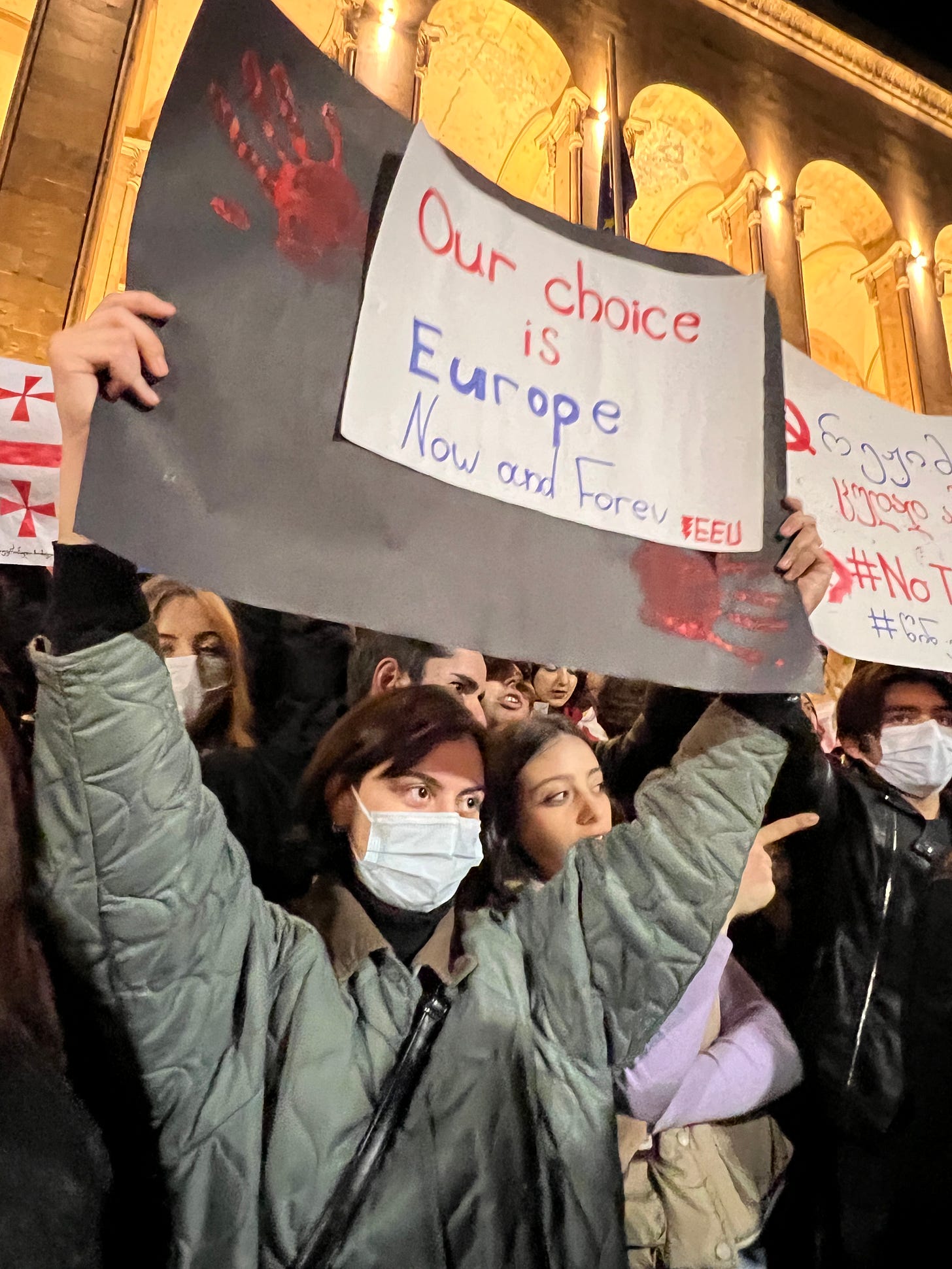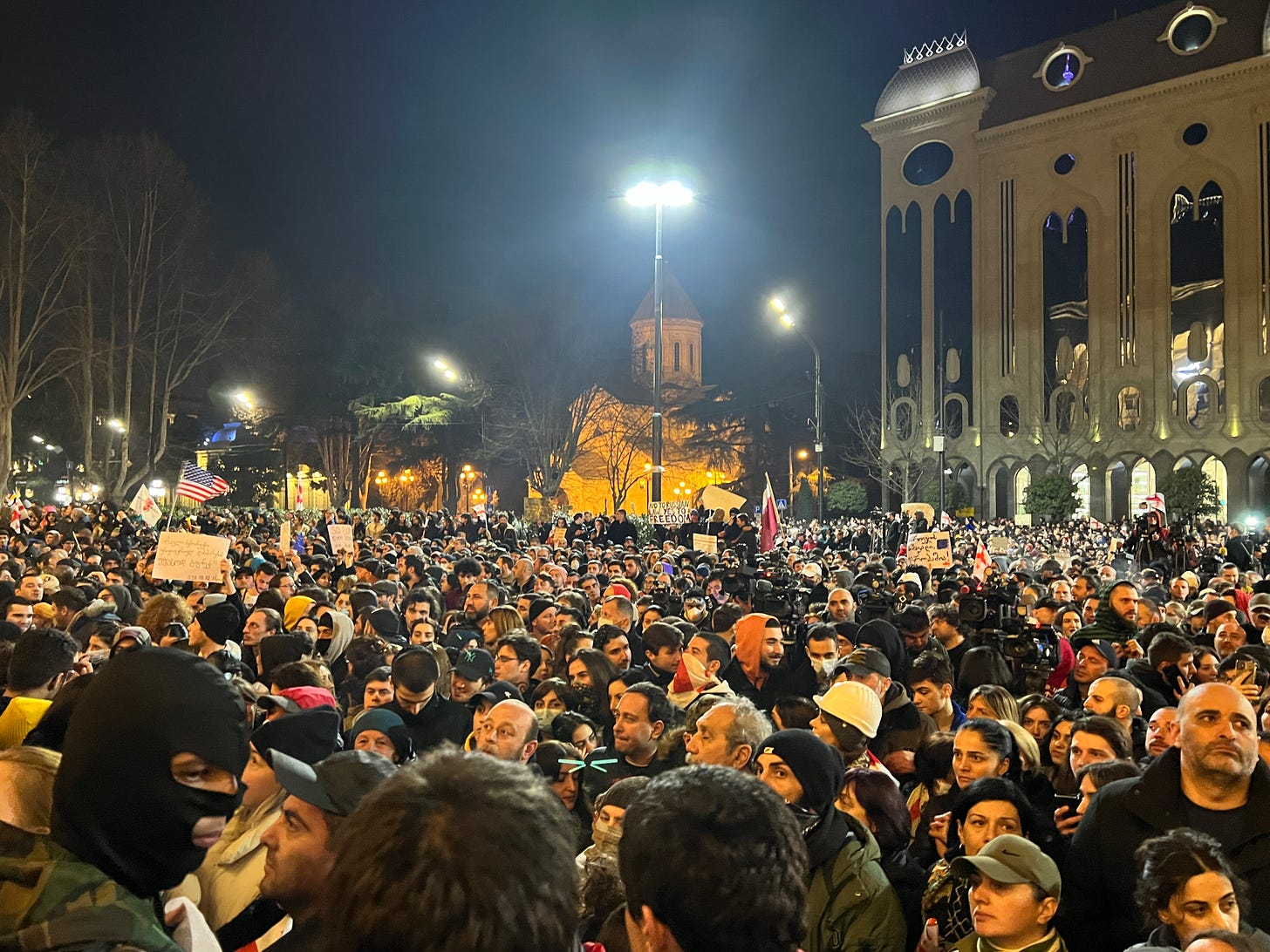I stumbled into a colour revolution.
Although most are too young to remember life in Soviet Georgia, many are haunted by childhood memories of Russia’s invasion of their country in 2008.
(This article was originally published in the April 12, 2023, edition of the Toronto Star.)
Last month, I joined tens of thousands of Georgians in the streets of Tbilisi, the rugged capital of a democracy fighting to distance itself from its Soviet past. The crowd of mostly young pro-Westerners rallied against the Georgian Parliament’s proposed security legislation that would have aligned the country closer to the Kremlin.
For now, the bill is defeated, but it succeeded in proving that Putin’s hybrid war against democracy can be fought on many fronts — and that we must be vigilant against authoritarian encroachment wherever it exists.
Following two days of violent protests, the bill was “unconditionally withdrawn” by Georgian Dream (GD), the country’s ruling party, whose patron oligarch is Bidzina Ivanishvili, a man who amassed his billions of dollars in Russia during the collapse of the Soviet Union. The security bill would have required many of the country’s NGOs, media, and pro-democracy watchdogs to register as foreign agents, stigmatizing and effectively neutering civil society’s supervisory function in the run-up to next year’s parliamentary elections.
The bill was described by EU High Representative Josep Borrell as “incompatible with EU values” and its passage likely would have dashed any hope of Euro-Atlantic integration. Meanwhile, Georgia’s very constitution enshrines a legal commitment to “full integration” into the EU, an aspiration that 85 per cent of Georgians support. As one protester described to me: “This is the civilizational choice of the Georgian people.”
Yet, Tbilisi’s ruling authorities appear ready to turn their backs on the pro-European status quo. Given that it would all but guarantee the country’s incompatibility with the EU, Georgian Dream’s security agenda marks, at best, a disavowal of the European consensus and, at worst, an overt return to Russia’s sphere of influence.
It’s no surprise then that its withdrawal was met with disturbing reactions by Kremlin spokespeople, including barely veiled threats of military intervention and mischaracterizations of the March protests as an attempted coup.
During the second night of protests, I met Tamar Jakeli, 27, a Green activist and queer-feminist organizer of Tbilisi Pride. Curious, I asked her what her motivations were for showing up. “To keep Georgia pro-European, and to make sure what happened in Russia for the last 10 years doesn’t happen here [ …] it means fighting for the pro-Western path of Georgia,” she shouted over the sound of whistles, fireworks, and detonating stun grenades.
Behind the Parliament building, I ran into Giorgi Sioridze, a 35-year-old law lecturer at Georgian National University. “Since 1990, Georgian people have experienced civil war and three territorial wars — and, of course, Russia was always intervening,” he told me. “But now we still stand up and strike back.”
The protesters have defined their political lives in opposition to foundational traumas. Although most are too young to remember life in Soviet Georgia, many are haunted by childhood memories of Russia’s invasion of their country in the summer of 2008 — an incursion that saw 224 Georgians killed and some 230,000 displaced as internal refugees.
“We’re scared because 20 per cent of Georgia is occupied by Russia [and that] one day, either de jure or de facto, we will wake up and become part of Russia,” said graduate student Nukri Jintcharadze, 27, at a makeshift first aid station. We had just flushed tear gas from our bright red eyes.
The word “agent” carries strong associations in the post-Soviet world. Leonid Karas, Georgi Markov and Andrei Sinyavsky are the names of just a few dissidents shot dead, imprisoned, or otherwise disappeared by Moscow under the pretence of foreign agency. This month’s protests prove that young Georgians refuse to join them without a fight.
As in Ukraine and Moldova, it’s in Moscow’s interest to anchor Georgia in its orbit. Putin understands that this can be achieved without a single tank on Georgian soil, or a single bullet in a Georgian heart — all he needs is for Tbilisi to build itself in Moscow’s image.
Although Georgia is an imperiled democracy, it remains a beacon of freedom, whose youth are more Western in orientation than most westerners. We shouldn’t sit idly while Georgia turns toward the authoritarian path of their neighbours, in a region where democracy is as rare as it is fragile. As liberal democrats, we would fail the Georgian people to look the other way.






Fuck off American scum
Thanks for telling their stories ! ❤️